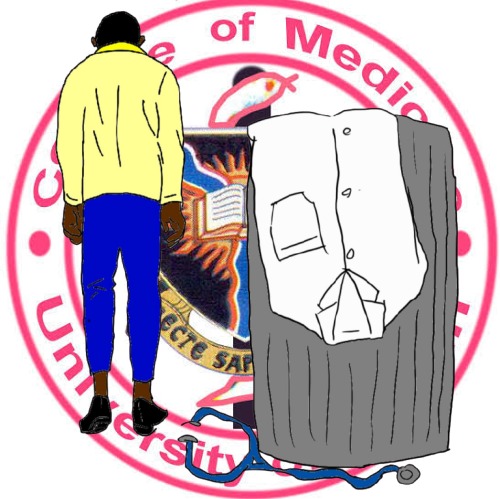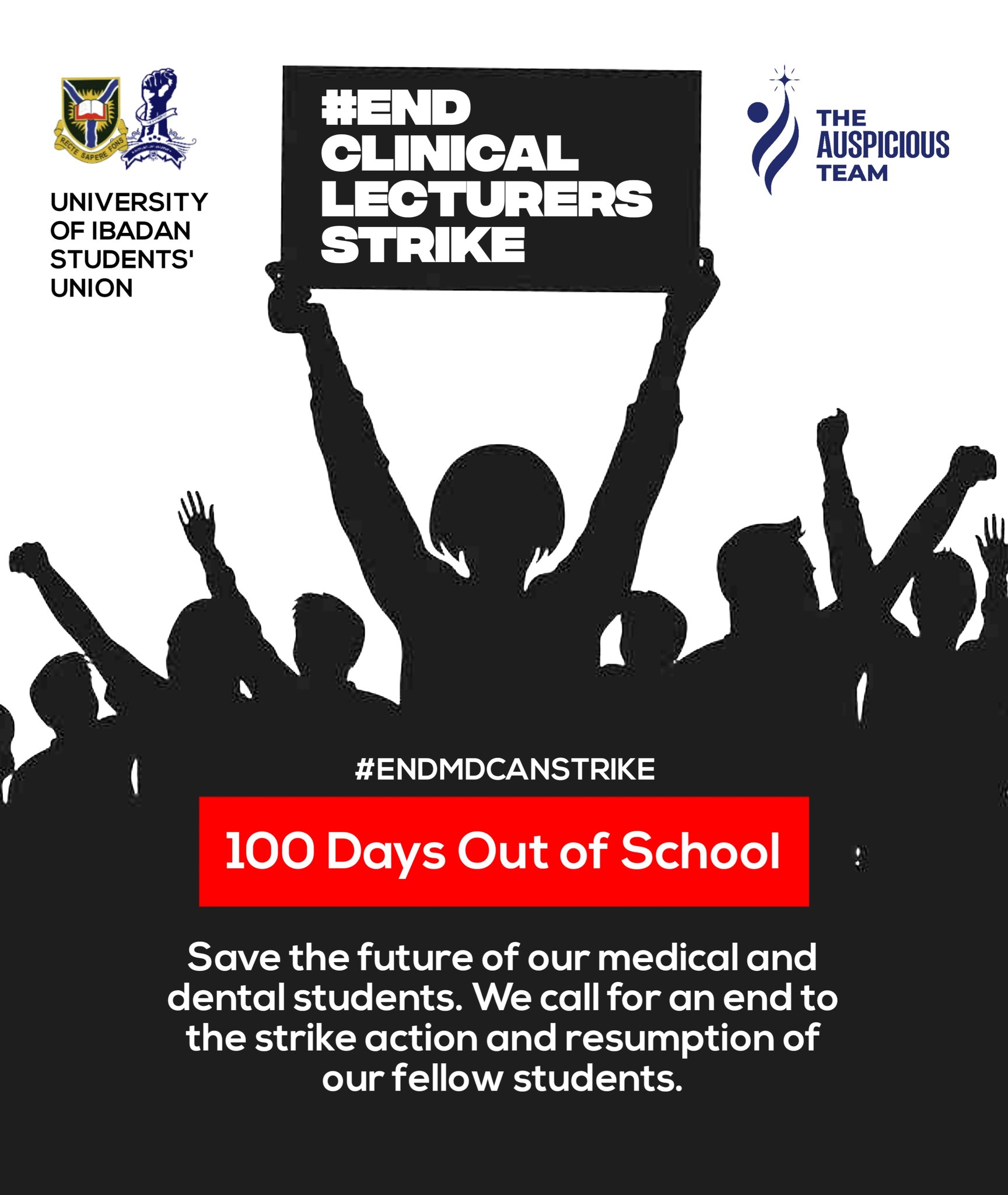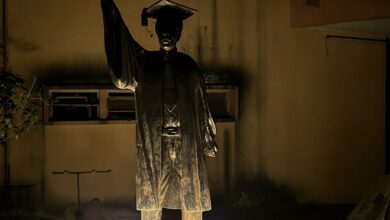The Cost of Making New Doctors: Consequence

There will be new doctors, but at a cost: that we have a say. Thus ended our last conversation on the cost of making new doctors just a year ago. To read that article back is a shock to the system, so similar are our problems now to then, so similar is our ineptitude now to then. And now we have eaten of the fruits of our labour, we have bitten this poisoned apple, and that darned fruit will indeed keep the doctor away from school. That editorial told of a 200% hike in school fees and of a dangerous communique from the University management we described as a cause for concern. That editorial discussed the limitations of the Student Loan Act, at the time still a proposition—it called into question as well the fruitlessness of dialogue between the SU, at the time led by Samson “Host” Tobiloba of the Faculty of Dentistry, COMUI, and the school management. It encouraged medical students to place themselves at the forefront of demonstrations, to call for and attend Congresses. Because paying the highest fees in the University for an extended period—six years, and even more, such as in the case of our current 700L class, yes you read that right, who just paid their seventh accommodation fees in this University—means that of this blood let on the ground, ours shall predominate.
But no, medical students were too busy playing volleyball and catching up with lovers on Saturday morning when Congress was to be held to be concerned. And their leaders, the UIMSA Executive Council and the Alexander Brown Hall ruling class, were much too oblivious to the crisis surrounding them to even lift a finger. Heck, the Student Union President is a Brownite, and you couldn’t have deciphered this fact that morning with the abject lack of urgency in affairs of Alexander Brown Hall. The abject lack of responsibility. No, all that matters here is pretty CVs and academic exploits; we turn a blind eye to our brethren who fall by the wayside. Because it’s how we’ve been bred, from standing atop dead bodies after the UTME to clambering over those who fall by the wayside in consecutive Medical Board examinations. It is this death of emotion that comes with the territory when you go from dissecting the dead to seeing them keel over in real time, to the point where you can look at a person and smell death, gloss over physical findings as though this human being were just another textbook diagram. And now we see our colleagues falter once again due to circumstances out of their control and nobody bats a goddamned eyelid.
The University of Ibadan has, of recent, become a citadel where poverty is punished and bureaucratic indifference is the default policy. About thirty medical students have just lost an academic year, not because they failed any exams or were suspended for any form of misconduct, but because they could not pay their school fees on time. These students have to defer a session, despite having attended classes, completing their postings and writing professional exams. For the majority of the thirty, their only crime is being poor in a system designed to humiliate the poor.
The University management, in a bid to enforce procedural deadlines and exploitative policy, has slammed the door shut on these students, and what’s even worse is that while these wounds are still fresh, the leadership of the student union has not only gone auspiciously, suspiciously silent, but they have even become complicit. And so we can effectively call it what it is: The University, aided by the Auspicious Team, has effectively criminalized poverty and institutionalized elitism.
This editorial aims to dissect every layer of this new policy from the school management. From the psychological torture of these students forced to sacrifice a year of their lives, to the systemic failure of the Students’ Union—every inch of this mess will be brought to the fore. Because we no longer have the luxury of silence and more importantly, because the students of the University of Ibadan deserve much better, and this truth, no matter how uncomfortable it seems, must be brought into light.
Where We Are
To explain, behind every euphemism like “deferment” or “portal closure” lies a person whose life has been negatively affected by this decision. And this is not fiction, there are already several such accounts in the public sphere of consciousness.
For example, in April, UCJ UI ran a story highlighting the specific struggles of students on this particular subject. Take Ayo, referenced in the article, for example. She attended her classes, sat for exams and fulfilled every other academic requirement, only to be told after all her efforts that she would not be progressing to the next level. Then you also have Ola, referenced in the same article, who consequently deferred not out of laziness, irresponsibility, but out of selflessness. He was on SIWES (Student Industrial Work Experience Scheme) and knowing that his father was already struggling to pay tuition for three children in the same University, he made a conscious decision to wait, thinking that the school, as it had done in previous years, would allow for late payments. He wrote no first-semester exams. He planned around a system he believed to be humane. He was wrong. By the time he came back from his SIWES, this door was slammed shut. And now, like Ayo, he will be repeating a year that he never failed. The mental toll of this trauma is incalculable. Those affected describe moments of guilt, feelings of failure, and strained relationships with family members.
While these stories are heartbreaking, what’s worse is the fact that they are not rare. They represent dozens of students, in this case, thirty medical students whose clinical schedules already isolate them from administrative updates due to the UI/UCH divide. And once again, if this were anywhere else, these decisions would be met with outrage—intense outrage—followed by possible reform. But instead, in the premier university, it is met with silence and inaction. This is what the school administration calls “order.” This is what the Students’ Union calls “nothing can be done.” This is what students must begin to call an act of institutional violence.
And in the face of overwhelming student hardship, what does the Students’ Union President offer as a lifeline? Not negotiation. Not advocacy. Not resistance. Instead, WhatsApp status updates urging students to apply for NELFUND—as though poverty could magically be erased with a hyperlink. But wait, let us dismantle this deception for what it is.
NELFUND (Nigerian Education Loan Fund) was introduced by the current government as a means to democratize access to education. But in practice, it has functioned as a bureaucratic black hole wrapped in false hope. This is a sentiment the UI’SU President himself once agreed with. A number of the thirty MBBS students currently being made to defer had applied for NELFUND, believing it would settle their tuition automatically. NELFUND does not pay fees directly into school accounts, it requires further processing. It involves delays, and all this must happen before an arbitrarily enforced deadline that leaves no room for exceptions or context. The very existence of this disconnect means that even students who sought help in good faith were still thrown under the bus.
Now, what did the SU President do with this knowledge?
He promoted NELFUND like it was the ultimate solution—like it was an excuse not to fight for a fee reduction, not to demand to open portals, not to hold management accountable. He weaponized hope as a smokescreen for his own cowardice and complicity. Instead of standing with the students who were drowning, he handed them an inflatable pool ring made of paper. This is gaslighting on an institutional scale.
The problem was never about students refusing to pay. The problem was students being unable to pay, and instead of tackling the root cause—high school fees and inflexible payment systems—Mr Odedele offered bureaucracy as a lifeline. We must be clear-eyed about this. NELFUND is not a solution when its design is not aligned with institutional realities. It is not a solution when it is used as a substitute for real advocacy, or when its structural delays are used to discredit student complaints. If the president truly believed in justice, he would be advocating for the affected students. Instead, he posted a status and went silent.
What we are witnessing is not just administrative dysfunction—it is the strategic use of confusion to silence dissent. It is the peddling of a false narrative that “help is available” so that no one asks why we need help to access education in the first place. NELFUND isn’t the solution; reducing school fees is. On May 19th, 2024, the University of Ibadan issued a cold memo through the office of the registrar, declaring that deadlines for school fee payments would no longer be extended. At its regular meeting on Wednesday, 3rd April, 2024, the Senate reiterated the importance of adhering to registration deadlines by students, faculty and staff. Deadlines for registration will no longer be extended once fixed, and students were to take cognizance of this information ahead of the 2023/2024 session. The Special Release ended with a cryptic “Please be guided.” That was it, there was to be no debate, no exceptions, no avenue for discussion with students blindsided by this new policy, and critically, no response from the Students’ Union. This would come a mere six days after the inauguration of the Aweda-led SU administration, an inauguration at which three students of the university: Nice Linus, Olamide Iyanuoluwa and Aduwo Ayodele, had protested school fees increment, an act for which they were subjected to a scandalous trial, deemed cause for Nice Linus to be today barred from serving on the Students’ Representative Council. Please be guided, their threat read.
Now, usually, UI offered a margin of grace. There was an understanding, however limited, that students might need extra time, especially in a country where bank transfers fail, where parents depend on irregular salaries or none at all, and where tuition isn’t just a payment but a gamble against survival. In previous sessions, late payments were permitted even well into the semester. Students counted on this precedent and why wouldn’t they? But then, in the same academic year that the school introduced a crushing hike in fees, they also chose to abolish leniency. Without a phased adjustment period. The result? Chaos. Confusion. Catastrophe.
And it isn’t just about money. It’s about what that money represents—a year of a student’s life, a future timeline, a hard-fought academic trajectory. Imagine a medical student who’s written their exams, done their postings, passed every clinical requirement, and perhaps even worked for a hard-fought distinction on a professional exam. All this is for naught when they are asked to repeat this year of study, because they were unaware of a scarcely publicised memo or a deadline changed without mercy. Deadlines, in a humane institution, should be tools for organization, not weapons of exclusion. But here, they have been sharpened and wielded as punishment—administered by a university that seems more eager to create dropouts than to graduate students.
And where is the outrage from the Students’ Union? Where is the demand for at least a reopening of the portal or a reinstatement of flexible payment? Nowhere. Because in UI today, bureaucracy has become brutality, and deadlines have been transformed into blunt instruments of academic execution. Let’s stop pretending this crisis began with missed deadlines. It didn’t. The real detonator of this slow-motion academic explosion was the massive hike in school fees for the 2023/2024 session—a move as arrogant as it was disconnected from economic reality.
The University of Ibadan, without adequate stakeholder engagement or socioeconomic consideration, raised tuition across faculties, including her College of Medicine, with no proportional increase in bursaries, waivers, or institutional support systems. It was a one-sided decision, executed with the cold detachment of technocrats who seem to believe that inflation only affects their budgets and not students’ lives. The timing couldn’t be more criminal.
According to the United Nations Development Programme, as of 2022, 63% of Nigerians were multidimensionally poor. Not just cash-poor, but systematically deprived across key areas of health, education, and living standards. These are not just abstract figures; they are the parents struggling with rent and food while trying to put their children through school. They are the students selling belongings, working multiple demanding jobs, or skipping meals just to meet tuition requirements.
And yet, in this economic hellscape, UI chose to increase fees and simultaneously shut the door on late payments—no staggered introduction, no means-testing, no emergency financial assistance packages.
What did they expect to happen? Of course, students would defer. Of course, students would break down. Of course, families would be torn apart. But that’s not an accident. That’s not a byproduct. That is the point—to thin the herd, to make education a luxury, to filter out the poor without ever saying the quiet part out loud. The injustice becomes even more grotesque when we zero in on medical students, who already spend more years in school than their peers, who endure gruelling clinical rotations and extended postings, who are expected to shoulder enormous academic and emotional burdens—and now must also endure institutional punishment for not being rich enough.
Think about that: a student could complete their 400-level coursework, ace their professional exams, pass their clinicals, and still have to repeat the entire year, not for academic failure, but for being financially excluded. Not even private universities are this ruthless.
And it has broader implications: we are not just failing these students—we are failing the nation. At a time when Nigeria is hemorrhaging doctors and healthcare professionals to the West, her educational system is actively sabotaging the few who remain. Medical education should be a national priority, not a profit margin. It should be a subsidized investment in our collective future, not a tool for enriching university coffers. But the message is loud and clear: If you’re poor, stay out of medicine. If you’re struggling, stay away from UI. Education, once the last hope of the poor, is now being auctioned off to the highest bidder.
And the worst part? This brutal system is not broken—it’s working exactly as designed.
It would be one thing if the University of Ibadan’s current policy were standard practice. If every institution in Nigeria or across Africa treated poor students like academic liabilities to be discarded at the first sign of financial difficulty. But they don’t. Let’s start with the University of Lagos (UNILAG). UNILAG doesn’t just acknowledge that students might struggle financially, it actively plans for it. The school offers instalmental payment options, particularly for indigent students. A student in UNILAG who cannot pay their fees in full isn’t threatened with deferral or academic extinction. They’re given time. They’re given dignity. And if we step beyond our borders, the contrast becomes even more jarring.
In Ghana’s Kwame Nkrumah University of Science and Technology (KNUST), students have access to structured financial aid programs and grace periods tied to need, not arbitrary digital deadlines. In South Africa’s University of Cape Town (UCT), one of the continent’s leading institutions, students can apply for emergency aid, defer payments, and even renegotiate tuition timelines, all through a transparent, student-centric system that understands one fundamental principle: no one should be denied education because of poverty.
Meanwhile, in Ibadan, the so-called “first and the best,” a student who misses a payment deadline by mere days, perhaps because their NELFUND process stalled or their parent’s salary was delayed, is told to lose an entire year—a year of their life, a year of learning, a year of dreams. There is no recourse, no consideration, just punishment.
Yes, it’s no news that the existence of NELFUND has shut the merciful eyes of the university authorities on her students. But as much as they hammer on students to use the scheme, much is left to be desired on actual sensitization of how payment works. Some of the students about to face the jeopardy of repeating a session they actively attended are victims of not finalising payments from their wallet to the university’s account. That begs the question of the efficiency of the NELFUND sessions alleged to have been held at the beginning of the 2023/2024 session and the 2024/2025 session. Are students really aware that they still have to make payments themselves after applying for NELFUND? These are the questions that need to be answered.
Perhaps the most bitter pill in this entire fiasco is not the fee hike—not even the deferrals. It’s the breathtaking cowardice of the very people elected to defend students. Covenant Odedele’s Students’ Union administration has not only failed in its duty, it has actively aided the oppression of students by aligning itself with the very forces responsible for this crisis. At every turn, this administration has chosen collusion over confrontation, silence over solidarity, and deceit over duty. When students demanded dialogue, Congress was suspended—not through a democratic process, not through an honest conversation, but under the false pretense of “security threats.” What was the alleged threat? A few student representatives demanding transparency and timeliness from their executives. That’s not harassment, that’s accountability. But the President, General Secretary, and PRO could not stomach even that. So what did they do? They shut down the only platform students had for collective resistance.
No Congress = No Debate. No Debate = No Pressure. No Pressure = No Change.
It was a political maneuver dressed in cowardice. One that effectively decapitated the student body’s voice when it was most needed. And then came the real insult.
Instead of advocating for emergency financial relief, the SU President advised students to defer. Let that sink in. Rather than demand that school fees be reduced, rather than demand that late payments be reopened, he told struggling students to vanish for a year. This wasn’t leadership. This was abdication. Some students like Ayo and Ola who reached out directly to the Union for help received silence. Not a meeting. Not a statement. Not even a proper acknowledgement. Just a WhatsApp post: “Go write a deferment letter.” Is this the role of a Students’ Union? To act as a courier service for the administration’s bad news? Or is it to protect, advocate, and fight?
Covenant Odedele’s administration has done more than disappoint—it has betrayed. By suspending Congress, it has silenced dissent. By echoing management’s indifference, it has deepened student suffering. And by retreating in the face of injustice, it has shown that its allegiance lies not with the students, but with power. So let’s ask the only question that matters:
Who does the SU President serve? The management, or the students who elected him?
Because right now, every action, every silence, screams the answer. And it is not the students.
And it’s even worse on medical students, already burdened with longer academic years than any other faculty, mandatory clinical postings that span nights, weekends, and holidays, and professional exams that determine national placement and specialization. To understand the true weight of what is happening at the University of Ibadan, we must widen the lens. This isn’t just about academic deferral. It’s about the death of a profession and the collapse of a country’s last line of defense: its healthcare system. Nigeria’s health sector is on life support, and the numbers are damning.
According to the Nigerian Association of Resident Doctors (NARD), 3,974 doctors left the country in 2024, which was the highest number in two decades, and this exodus is not slowing down. If anything, it is accelerating. Young doctors are only graduating to run away. Older doctors are resigning out of frustration. Specialists are being poached by countries that value their lives and their work. We are hemorrhaging human capital. Why? Because there are no meaningful retention policies, no incentives, and no vision for building a sustainable, empowered medical workforce. Instead, doctors are met with: delayed residency, unpaid housemanships, rotten infrastructure and internships, and now, thanks to UI, an education system that punishes medical students before they even become doctors.
The University of Ibadan, one of Nigeria’s flagship training grounds for health professionals, has effectively decided that if you cannot afford to pay in full, you do not deserve to learn. Not only is this unconscionable, it is nationally suicidal. Let’s be clear: Medical education in Nigeria is no longer a necessity. It has become a luxury. A product. A gated opportunity. If your parents can’t pay about a quarter of a million Naira on short notice, you don’t get to save lives. You don’t get to be a doctor. You don’t get to contribute to the rescue of a dying nation. This is the final nail in the coffin for public medical education in Nigeria. This is the moment we crossed the threshold. From a system in crisis to a system complicit in its own destruction.
Let there be no mistake: the only true solution is a reduction in school fees. Not scholarships for the lucky few. Not NELFUND delays wrapped in bureaucracy, not deferment letters signed in silence. Fee reduction now. And for that to happen, the students need to be able to meet and make a decision. We demand an immediate Students’ Congress. Not postponed, not delayed, not silenced under the cowardly cloak of “security concerns.” We demand a Congress that is entirely focused on fee reduction, with no distractions, no diplomacy, and no compromise on the core issue. Education is not a luxury. It is not a privilege for the wealthy. It is a fundamental human right. And we will not stand by while it is buried beneath memos, portals, and cowardly silence.




